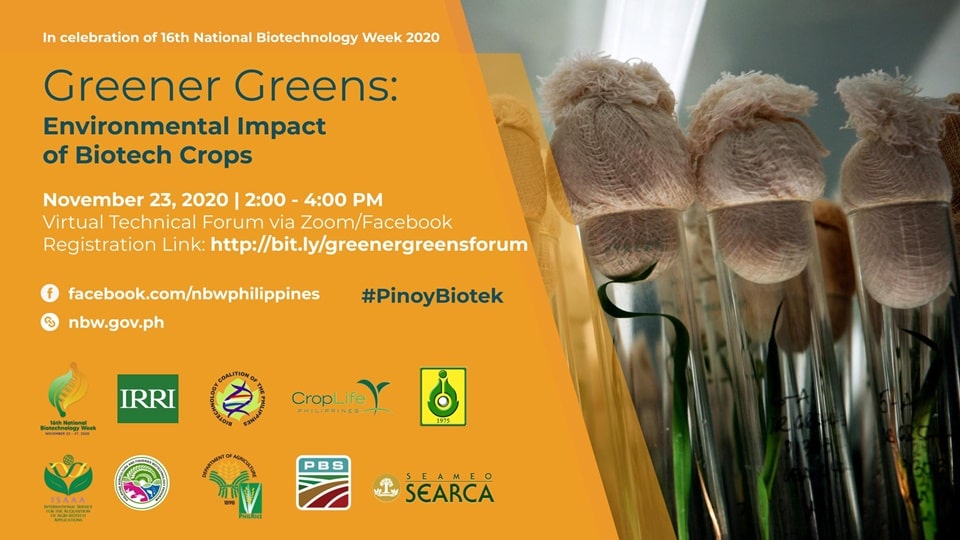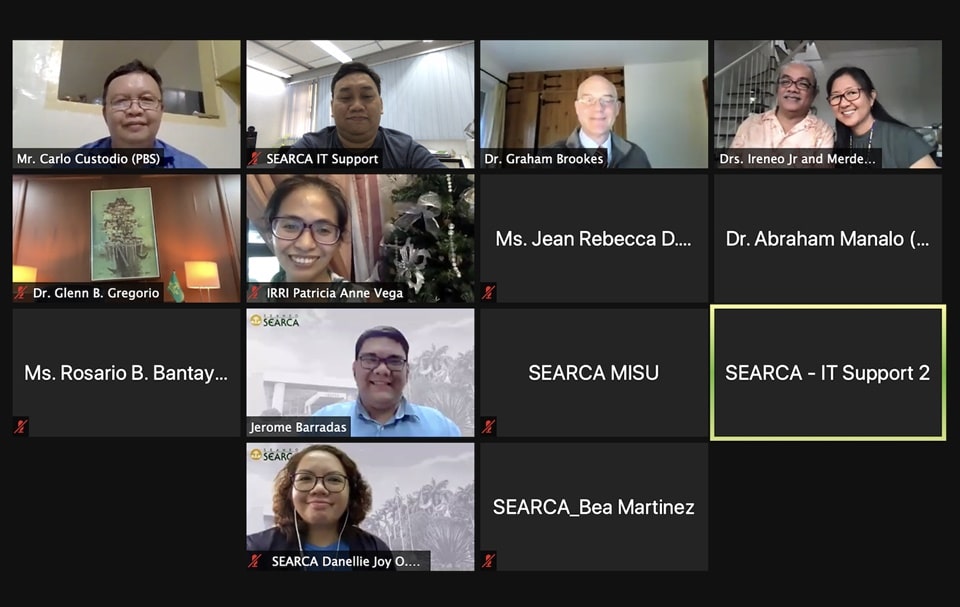
Encouraging public discussion in order to improve understanding of agricultural biotechnology, SEARCA and various partner agencies held a technical forum titled, “Greener Greens: Environmental Impact of Biotech Crops” on 23 November 2020 via Zoom and Facebook Live.
The virtual forum provided a platform where different stakeholders most especially students, teachers, researchers, and farmers can interact with local and international experts in order to have a better understanding of biotechnology and its potential to mitigate pressing environmental issues.
More than a thousand participants (684 via Facebook Live and 403 via Zoom) from Asia, Europe, and South America attended the forum. There was also a great turnout from students and teachers from different universities in the Philippines.
SEARCA Director Dr. Glenn B. Gregorio welcomed the participants to the activity and underlined the pressing need to adapt and respond to the changing times brought about by different global crises such as the COVID-19 pandemic. “As current global pandemic and recent calamities put more pressure on every sector of society to be innovative, it is high time to emphasize the positive impacts of biotechnology on the various sectors especially in the area of environmental protection and sustainability, which also encompasses food production and consumption,” he stated.
Dr. Gregorio also reaffirmed SEARCA’s commitment to promote credible, science-based innovations and contribute to the achievement of the sustainable development goals that address global challenges through its recently launched 11th Five-Year Plan with the overarching theme of “Accelerating Transformation Through Agricultural Innovation” or ATTAIN.
Dr. Graham Brookes, an agricultural economist from the UK-based PG Economics Ltd, discussed the cumulative impact of using genetically modified (GM) crop technology in agriculture from 1996 to 2018. Apart from significant net economic benefits at the farm level amounting to more than USD 200 billion over a period of 22 years, Dr. Brookes also presented key environmental impacts associated with using crop biotechnology such as reduced pesticide application by 775.4 million kg (8.3%). This resulted in the decreased environmental impact associated with herbicide and insecticide use on crops. “Genetic modification is an important contribution to increasing world production of soybeans, corn, canola and cotton – resulting in higher yields, higher incomes, more reliable food supply, adoption of more sustainable farming systems, more environmentally-friendly farming methods, and reduction in carbon emissions,” Dr. Brookes said.
Scientist couple Dr. Merdelyn Caasi-Lit and Dr. Ireneo Lit from the University of the Philippines Los Baños (UPLB) continued with the presentation of their study on Bacillus Thuringiensis (Bt) Corn and arthropod biodiversity in corn fields. As Bt corn ensures good yield by protecting the crop against corn borer infestation and reducing farm inputs for pesticide use, it has also proven to be beneficial for agrobiodiversity. “Increased arthropod diversity should be considered precious bonuses added to the economic gains of planting Bt corn. They make Bt corn farming more ecologically sound and environmentally sustainable,” according to Dr. Caasi-Lit.

The experts then addressed questions and concerns from participants ranging from mitigating possible environmental impact of unauthorized GM seeds; recommendations on existing regulatory policies; status of CRISPR-Cas9 projects in the country; and effective means of promoting knowledge about the advantages of GMOs in agriculture and economy.
The Greener Greens technical forum was conducted in partnership with the Biotechnology Coalition of the Philippines, CropLife Asia, Program for Biosafety Systems, International Rice Research Institute, Philippine Rice Research Institute, Department of Agriculture-Biotechnology Program Office, UPLB-Institute of Plant Breeding, and the International Service for the Acquisition of Agri-biotech Applications as part of the 16th National Biotechnology Week celebration spearheaded by the Department of Environment and Natural Resources with the theme, “Bioteknolohiya: Pagbangon at Pag-asa Tungo sa Matatag na Komunidad, Kapaligiran, at Ekonomiya.”